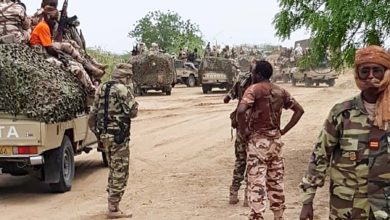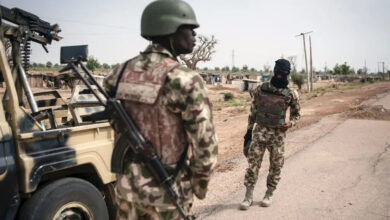Six Nigerian soldiers were killed and 14 injured when Boko Haram militants raided Kamuya, security and hospital sources said on Saturday, January 19.
Militants attacked an army position on Thursday in Kamuya, a village in the northeastern Borno state, near the home of Chief of Army Staff Lieutenant General Tukur Yusuf Buratai’s mother, the sources said.
“We lost six soldiers in the fight and 14 others sustained various degrees of injuries,” an army officer said.
“The terrorists also suffered heavy losses,” the officer added without giving figures.
A medic at the hospital in nearby Damaturu confirmed that the bodies of six soldiers were taken to the morgue on Friday.
Militants captured four military vehicles and destroyed two others, said the military source who asked not to be identified because he was not authorised to speak about the incident.
Security sources told AFP on Friday that troops had fought off the militants who failed to overrun the post.
The attack began at about 5pm (1600 GMT) and lasted for around three hours, with the gunmen meeting “stiff resistance from the soldiers,” civilian militia leader Mustapha Karimbe said from the town of Biu, around 30 km (18 miles) from Kamuya.
“The soldiers stood their ground and fought the terrorists for close to three hours and forced them to flee,” a military officer in the Borno state capital, Maiduguri, told AFP.
Kamuya was hit twice by Boko Haram in December 2015, not long after Buratai was appointed Chief of Army Staff.
It is unclear which Boko Haram faction was behind the attack, although Islamic State West Africa province is known to operate in the area.
Update January 25 ISIS in its al-Naba magazine claimed ISWA fighters carried out the attack.
Boko Haram split into two factions in mid-2016. One is led by Abu Mus’ab Al-Barnawi and largely focuses on attacking military and government targets, while the other, led by Abubakar Shekau, is notorious for suicide bombings and indiscriminate killings of civilians.
Shekau has pledged allegiance to ISIS leader Abu Bakr Al-Baghdadi, but ISIS central gave its formal backing to the Barnawi faction, which is known as Islamic State West Africa province.
The raid on Kamuya came days after the Shekau faction Boko Haram claimed its fighters overran a military base in Rann, near the border with Cameroon.
Nigerian government forces reportedly fled after militants targeted a military base in the January 14 attack in Rann, around 175 km (110 miles) northeast of the Borno state capital, Maiduguri, forcing thousands of civilians to flee towards the border.
Medecins Sans Frontieres (Doctors Without Borders) said on Wednesday that 14 people including three soldiers were killed in the assault on Rann, and aid workers said buildings used by humanitarian organisations had been burned to the ground.
The U.N.’s humanitarian coordinator in Nigeria, Edward Kallon, said on Friday that the attacks – and others like it – were having a “devastating impact” on civilians and the relief effort.
There have been dozens of attacks on military bases since July, most of which have been blamed on ISWA, or claimed by ISIS as ISWA attacks.
The raids are part of a wider pattern of attacks in northern Borno, which the United Nations has warned is increasingly affecting civilians.
ISWA has lately intensified its armed campaign, launching a number of major assaults on military targets in Borno and neighboring Yobe state amid signs of a takeover by more hardline leaders.
In the past week, ISIS claimed a number of soldiers were killed and injured in an ISWA mortar attack on Mallam Fatori, and released images of what it said was an ISWA attack on Magumeri.
The Nigerian Army said on January 17 that an infiltration attempt by Boko Haram militants in Gajiram two days earlier was “fiercely countered.”
Several militants were killed, Colonel Onyema Nwachukwu said in a statement published on Facebook, adding that troops recovered an AK-type assault rifle and a rocket-propelled grenade launcher, among other military equipment,
More than 27,000 people have been killed since the insurgency began in 2009, and 1.8 million people are still homeless and in need of humanitarian assistance.
Nigeria’s President Muhammadu Buhari said in December 2015 that Boko Haram were “technically defeated” after a sustained counter-insurgency.
But on January 9 he acknowledged setbacks in the fight-back, including “battle fatigue” among soldiers from a wave of guerrilla style hit-and-run tactics and suicide bombings.
Buhari was elected in 2015 on a promise to end the conflict and security has again become an election issue as he seeks a second term in the presidential election on February 16. National Assembly elections will be held the same day, while regional polls are set for March 2.
Nigeria’s military struggles with Islamic State: Part 1 – an upsurge in attacks
With reporting from AFP












